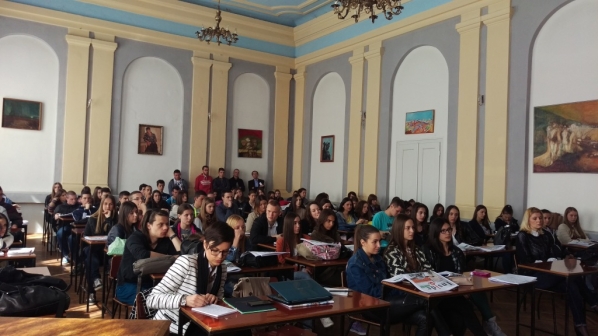In accordance with activity organised by the Committee on European Integration with the aim of bringing the European process closer to citizens, a debate on the topic of European integration was held in Grammar School “Tanasije Pejatović” in Pljevlja today.
On the occasion, members of the delegation spoke with participants on the EU idea, but also on the current phase of Montenegro’s integration to the EU. During the debate, they stressed the obligation of respecting membership criteria, and the need for adopting European standards and values. MPs stressed that the process was not elitist but related to the whole society, thus this was the reason for constantly high number of citizens supporting the EU membership. Also, they said that, technically, the process of the European integration was conducted with dynamics, and expressed expectation that students would soon have an opportunity to feel concreate benefits of the process primarily through possibility of studying abroad and then, after joining the EU, through equal conditions for employment in any of the member states.
At one of the most visited debates so far, the participants were mostly interested in the education system of Europe, particularly if secondary education would be compulsory if Montenegro joined the EU, but also the relation of the EU to the youth and sports. They also gave concreate comments on finding a solution for overcoming challenges in the field of environment, and the importance of establishing new institutions in the field such as food safety. Answering to the questions, MPs said that the adoption of laws was important, but ensuring the implementation of the normative framework was of a greater importance.
At the meeting with representatives of the Municipality, President of the Local Assembly Mr Tarik Gadžović said that European integration process was complex and dynamic, and praised this activity of the Committee as an opportunity for improving the cooperation of the local and state bodies. He was particularly interested in negotiation chapter 27 - Environment and climate change, and emphasised good cooperation with the Government and responsible ministry with regard to that. However, the lack of administrative capacities and co-financing are the most demanding challenges in the context of application for and using means from the European funds. Representatives of nongovernmental organisations presented their work, and on the occasion, they said that the most important goal was strengthening civil sector and cooperation with local authorities. When it comes to current projects, they spoke mostly on projects of managing wastewaters, implemented in several phases: Construction of wastewater treatment plant, building of main collector and cleaning riverbeds of Ćehotina River. Representatives of nongovernmental organisations spoke on the project of monitoring the Public Administration Development Strategy 2014-2020, opening of Resource Centre for the Development of Civil Society, and projects aimed at employment of persons with disabilities.
Aside from President of the Municipality, the meeting was attended by Mr Zoran Čolović, Secretary of the Secretariat for housing and utilities, transport and water, Ms Head of the Department for European Integration and Development, and representatives of local communities and nongovernmental organisations active in using the means from the EU funds.
Delegation of the Committee on European Integration was composed of MPs: Ms Nada Drobnjak, Mr Vuko Roćen and Mr Danko Šarančić. The meeting with representatives of the Municipality was also attended by MP Ms Maida Bešlić.









